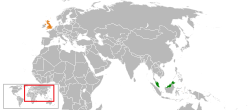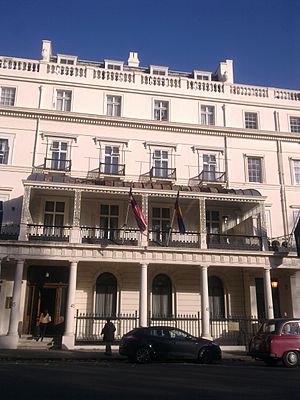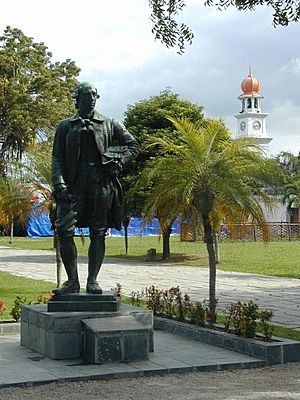Malaysia–United Kingdom relations facts for kids
 |
|
Malaysia |
United Kingdom |
|---|---|
| Diplomatic Mission | |
| Malaysian High Commission, London | British High Commission, Kuala Lumpur |
| Envoy | |
| High Commissioner Datuk Mohamad Sadik Kethergany | High Commissioner Charles Hay |
Malaysia and the United Kingdom have a long history of friendship and cooperation. They share special ties because Malaysia was once part of the British Empire. Today, both countries have embassies (called "high commissions") in each other's capitals. They are also both full members of the Commonwealth of Nations, a group of countries that were mostly part of the British Empire.
Contents

How British Influence Began

English traders first came to Malay waters in the 1600s. For a long time, Britain was mostly interested in trade, not in taking over land. However, as trade with China grew, the East India Company (a big British trading company) wanted more bases in the region.
In 1786, Britain made its first permanent land deal by leasing Penang from the Sultanate of Kedah. Soon after, they leased land on the mainland called Province Wellesley. During the Napoleonic Wars in 1795, the British also took over Dutch Malacca with the Netherlands' permission. This was to stop France from getting control of the area.
Formalizing British Control
In 1824, a treaty called the Anglo-Dutch Treaty of 1824 officially divided the Malay Archipelago between Britain and the Netherlands. The Dutch left Malacca and agreed that Malaya was Britain's area. In return, Britain recognized Dutch rule over other parts of Southeast Asia.
By 1826, Britain controlled Penang, Malacca, Singapore, and Labuan. These places became "crown colonies" called the Straits Settlements. They were first managed by the East India Company. Then, in 1867, they were taken over by the British government in London.
Meanwhile, British adventurers like James Brooke ruled Sarawak from 1841 to 1946. North Borneo was set up by a company called the North Borneo Chartered Company. Both Sarawak and North Borneo later became British "protectorates" (meaning Britain protected them). In 1946, they became crown colonies.
The Road to Independence
In 1944, Britain planned to unite the Malay states (except Singapore) into one crown colony called the Malayan Union. This was a step towards independence. The Malayan Union was formed in 1946 but was replaced in 1948 by the Federation of Malaya.
The Federation of Malaya became independent from the United Kingdom on August 31, 1957. On September 16, 1963, it joined with North Borneo, Sarawak, and Singapore to form the new country of Malaysia. However, Singapore left Malaysia in 1965 after some disagreements.
Modern Day Relations

The relationship between Malaysia and the UK today is shaped by their shared history. Many leaders and royals from both countries have visited each other.
For example, Malaysia's King, Sultan Abdul Halim of Kedah, visited the UK in 1974. Another King, Sultan Azlan Shah of Perak, visited in 1993. Queen Elizabeth II of the UK visited Malaysia in 1989 and 1998.
More recently, UK Prime Minister David Cameron visited Malaysia in 2012. Prince William and his wife Catherine also visited Malaysia in 2012 to celebrate Queen Elizabeth's Diamond Jubilee. In 2017, Prince Charles and his wife Camilla, the Duchess of Cornwall visited Malaysia to celebrate 60 years of friendship between the two countries.
Economic Connections: Trade and Business
Since 1963, the British Malaysian Chamber of Commerce (BMCC) has helped British businesses in Malaysia. They offer networking, share knowledge, and provide trade support.
Malaysia is the UK's second-biggest trading partner in ASEAN (a group of Southeast Asian nations).
In 2017, the UK was Malaysia's fourth-largest trading partner in the European Union (EU). Their trade in goods and services was worth about £3.34 billion. After the UK decided to leave the EU (known as Brexit), the UK's Secretary of International Trade, Dr Liam Fox, said the UK wanted to increase trade with Malaysia. He also noted that Malaysian companies had invested a lot in the UK, for example, in the Battersea Power Station. Malaysia also said it was ready to work with the UK.
In September 2017, the UK Prime Minister's trade envoy, Richard Graham, visited Malaysia. He promoted UK education and encouraged Malaysian companies to invest in the UK. He also said the UK had more than doubled its export funds to £5 billion to support trade with Malaysia. In October 2017, 50 UK technology companies visited Malaysia to find new business deals.
In 1996, the two countries signed an agreement to avoid double taxation. This means businesses don't pay taxes twice on the same income.
In July 2023, the UK joined the Comprehensive and Progressive Agreement for Trans-Pacific Partnership (CPTPP). This is a big trade group that Malaysia helped start. This agreement is the first free trade deal between the two countries.
Education Links: Learning Together
The British Council has helped thousands of primary school teachers in East Malaysia improve their English. This is part of a project with the Malaysian government.
Many students in Malaysia get UK degrees without leaving their country. Over 50% of all non-local university programs in Malaysia lead to a UK degree. Malaysia is the second-largest host country for these UK programs.
Five UK universities have opened branch campuses in Malaysia:
- University of Southampton Malaysia Campus
- Newcastle University Medicine Malaysia
- University of Reading
- University of Nottingham Malaysia Campus
- Heriot-Watt University Malaysia
These universities are checked by both UK and Malaysian quality agencies.
British independent schools are also opening campuses in Malaysia. They want to reach the growing international school market in Asia. As of 2021, three independent schools have campuses in Malaysia:
- Epsom College Malaysia
- Marlborough College Malaysia
- Charterhouse School
In August 2022, Concord College announced plans to build an international school in Sepang.
Security Cooperation: Keeping Safe
The United Kingdom works closely with Malaysia's Ministry of Defence and the Malaysian Armed Forces. This relationship started during the time of British rule.
Since 1971, Malaysia and the United Kingdom have both been members of the Five Powers Defence Arrangements. This agreement helps them work together on defence and security matters.
Images for kids
-
This memorial remembers 641 British soldiers who died during the Sandakan Death Marches and at Ranau, Sabah, Malaysia from 1943 to 1945.
 | Jackie Robinson |
 | Jack Johnson |
 | Althea Gibson |
 | Arthur Ashe |
 | Muhammad Ali |




